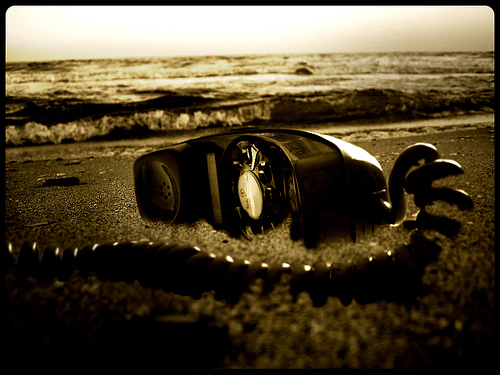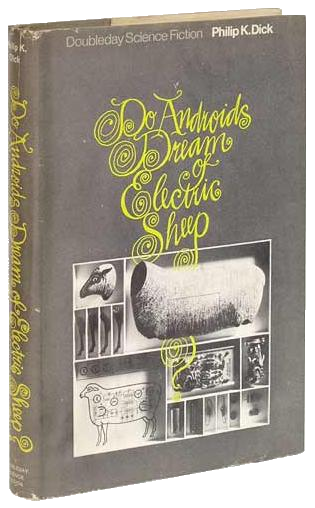
ENG502.001
Modern Literary Theory: Objects, Actants, Networks
Prof. Eileen Joy
SPRING 2011
Mondays 6:00-8:50 (Peck Hall 2414)

"The world is neither a grey matrix of objective elements, nor raw material for a sexy human drama projected onto gravel and sludge. Instead, it is filled with points of reality woven together only loosely: an archipelago of oracles or bombs that explode from concealment only to generate new sequestered temples. . . . This entails that all contact must be asymmetrical. However deeply I burrow into the world, I never encounter anything but sensual objects, and neither do real objects ever encounter anything but my own sensual facade." --Graham Harman, "On Vicarious Causation"
"Nothing and no one is willing any longer to agree to serve as a simple means to the exercise of any will whatsoever taken as an ultimate end. The tiniest maggot, the smallest rodent, the scantiest river, the farthest star, the most humble automatic machines--each demands to be taken also as an end, by the same right as the beggar Lazarus at the door of the selfish rich man." --Bruno Latour, The Politics of Nature: How to Bring the Sciences into Democracy
"There will come a time when it isn't 'They're spying on me through my phone' anymore. Eventually, it will be 'My phone is spying on me'." --Philip K. Dick
COURSE DESCRIPTION
This course continues the study of modern literary theory begun in English 501, and using that course as a launching pad, plunges you into an intensive immersion in one or more "currents" of contemporary theory. For this section of 502, we are going to engage with some recent "turns" in contemporary thinking that all share related interests in things, networks, assemblages, swarms, systems, ecologies, actants, bodies (human and otherwise), embodiments, queer "becomings" (over "Being"), virtualities, machines, technologies, and the post-human. As opposed to what has been a more-than-general state of affairs within the traditional humanities whereby the human has stood as the central figure and maker of meaning, this course will investigate the ways in which the human's central role has been up-ended in humanistic thought in favor of analyses of the charged pathways embedded in and unleashed by the turbulent and non-hierarchichal networks made up of animals, plants, persons, crowds, machines, microchips, fungus, stones, storm drains, oil, debris, food, viruses, glaciers, rivers, highways, swarms, briefcases, audio waves, deserts, and the like. As a result, humanistic studies have been looking for and devising what Julian Yates calls new "regimes of description, such as the actor-networks of Bruno Latour, the cyborg, companion or multi-species of Donna Haraway," not to mention the queer phenomenologies of Sara Ahmed, the zoontologies of Cary Wolfe, the distributed cognition of Andy Clark, the rhizomatic schizoanalysis of Gilles Deleueze and Félix Guattari, the speculative relalism of Graham Harman, and so on, all of which assume, as Yates writes, that "ontological boundaries (subject/object, human/animal, animate/inanimate) are never stable, so much as evolving propositions, unfinished sentences . . . which always find a way of running on, for good or ill." This course will serve as "getting one's feet wet" in these new regimes of description, and in addition to the reading of theoretical texts, we will also investigate the possible applications of the ideas raised in these texts in a variety of specualtive and science-fiction texts and films, with a special emphasis on the creative fictions of Philip K. Dick, J.G. Ballard, and David Cronenberg. Along the way we'll also ask ourselves if it's true, as J.G. Ballard once said, that "everything is becoming science fiction," from which our reality has "sprung intact."
As this is a graduate seminar-style course, preparing for and participating in class are vitally important to your ultimate success, and therefore, your contribution to in-class discussions as well as your attendance record will be factored into your final grade. Although I will provide guidance and commentary, the students are essentially the discussion leaders of this course. As this is also a reading-intensive course, not keeping up with the reading could be extremely detrimental to your progress and final evaluation. One final (but important) word: coming to class without the texts under discussion will count as an absence.
REQUIRED TEXTS (available at University Bookstore in Morris University Center)
J.G. Ballard. THE BEST SHORT STORIES OF J.G. BALLARD. Picador, 2001. ISBN# 978-031-227844-1
Jane Bennett. VIBRANT MATTER: A POLITICAL ECOLOGY OF THINGS. Duke University Press, 2010. ISBN# 978-082-234633-3
Philip K. Dick. DO ANDROIDS DREAM OF ELECTRIC SHEEP? Del Ray, 1996. ISBN# 978-034-540447-3
Graham Harman. CIRCUS PHILOSOPHICUS. Zero Books, 2010. ISBN# 978-184-694400-0
SUGGESTED TEXTS (these are works of fiction that you might find interesting as primary texts for the final critical paper)
Margaret Atwood. ORYX AND CRAKE. Anchor Books, 2004.
Nicholason Baker. THE MEZZANINE. Grove Press, 1988.
J.G. Ballard. THE ATROCITY EXHIBITION. Re/Search Publications, 1990.
J.G. Ballard. CRASH. Picador, 2001.
Jorge Luis Borges. LABYRINTHS: SELECTED STORIES AND OTHER WRITINGS. New Directions, 1962.
William Burroughs. INTERZONE. Penguin Books, 1989.
J.M. Coetzee. DISGRACE. Penguin Books, 1999.
J.M. Coetzee. ELIZABETH COSTELLO. Viking, 2003.
Samuel R. Delany. DHALGREN. Vintage Books, 2001.
Philip K. Dick. SELECTED STORIES OF PHILIP K. DICK. Random House, 2002.
Philip K. Dick. THE THREE STIGMATA OF PALMER ELDRITCH. Vintage Books, 1991.
William Gibson. NEUROMANCER. Ace Books, 1984.
Kazuo Ishiguru. NEVER LET ME GO. Vintage Books, 2010.
Haruki Murakami. HARDBOILED WONDERLAND AT THE END OF THE WORLD. Vintage International, 1993.
Richard Powers. THE ECHO MAKER. Farar, Straus and Giroux, 2006.
Richard Powers. GALATEA 2.2. Picador, 1995.
Neal Stephenson. SNOW CRASH. Bantam Books, 1992.
Colson Whitehead. THE INTUITIONIST. Doubleday, 1998.
Jeannette Winterson. THE STONE GODS. Harcourt Books, 2007.
Charles Yu. HOW TO LIFE SAFELY IN A SCIENCE FICTION UNIVERSE. Pantheon, 2010.
*MANY of the readings for the course have been placed on Electronic Course Reserve (these are indicated on "Schedule of Events" below)
NETFLIX ACCOUNT
In addition to the required readings (see "Schedule of Events" below), there will be films assigned about every other week that must be viewed outside of class, and the best way to get your hands on these films is through establishing a Netflix account, which is fairly inexpensive (some of you may already have an account, and you may also want to pool your resources and watch films together). The films you will be required to watch outside of class are: Moon, The Thin Red Line (1998), Code 46, Crash (1996), The Fly (1986), eXistenZ, and A.I. We will also watch The Life Aquatic with Steve Zissou in class together on April 4th.

COURSE REQUIREMENTS
1 CRITICAL PAPER, 12-15 pages (50%)
A two-part project: an annotated bibliography (due in March, after Spring Break) and a critical research paper. The bibliography is for the purposes of demonstrating what you have been reading & skimming outside of required class readings, and from which you are expected to have begun to formulate some leading questions for your critical paper. I will meet with each student individually to discuss the bibliography and possible directions for the paper. In the paper, you are expected to develop your own questions, subjects, and approaches; introduction of secondary texts, critics, media, and ideas is required. This paper should deliver an original critical perspective and argument, and it should situate its argument in the context of the intellectual ideas encountered in course readings and class discussion, supplemented by additional secondary research. Your argument must be primarily grounded in an analysis of at least one literary text, which can be chosen from our syllabus (required and/or recommended texts) or from syllabi in your other courses (or even from your own readings in literature outside of this and other courses--the key here is: I have to approve the text, or texts, chosen, and they should be as appropriate as possible in relation to the themes of this course; science fiction and speculative fiction texts will work best, but anything is possible given the variety of). The primary literary text can also be supplemented by one or more filmsTo help you get started, go HERE for a working bibliography of secondary sources relevant to the subjects under discussion in this course.
SHORT READING RESPONSES (40%)
To facilitate class discussion, you will write short responses (roughly in the neighborhood of 2 typed pages) to weekly readings. It is up to you to decide which reading (or readings) to respond to, and in what manner. These short reading responses don't begin until after we've acclimated ourselves (typically in the third or fourth week of the course--see Schedule of Events below), and they are not due in the last few weeks of the course, in order to give you more time for your fnal paper research and writing. It is expected that, in these responses, you will critically engage the texts (literary and/or otherwise) under discussion in relation to the ideas raised in class discussions and in relation to any ideas and/or texts encountered in other courses that might be relevant. These short responses will aid you in developing close reading skills and critical writing techniques that are crucial to your success with the longer critical paper, and it is imperative that these short responses NEVER do the following: a) merely summarize the reading; b) detail what you "like" or "don't like" about the reading, with no serious critical commentary; c) evaluate the author's skill as a writer according to your personal aesthetic criteria; or d) use the reading as a point of departure for a discussion of something that has nothing to do with the reading or discussions or themes of class.
PARTICIPATION (10%)
As stated above under "Course Description," participation is vital to your success in this course. Further, as a graduate-level seminar, the course is designed to have a primary emphasis on student-driven discussion. That means having a good attendance record, coming to class prepared to discuss the readings (with books and other texts in hand), and actively initiating and contributing to critically engaged conversations with your professor and peers.
LATE ASSIGNMENT POLICY
I do not accept late assignments. Period. If there is an extraordinarily good reason for needing an extension on a due date, let me know in advance.
ATTENDANCE POLICY
Attendance, promptness, and participation are essential to success in college courses. Faculty members recognize that unexpected occasions may arise when a student must be absent from class, but my general attendance policy is that if you are absent more than the number of required class sessions per week (in this case, that would be more than 1 evening session), I have the option of lowering your final course grade by one letter grade for each additional session missed. Furthermore, if absences become excessive (more than two weeks' worth of sessions), the SIUE Registrar, at my request, reserves the right to withdraw you administratively. For more information on this, please consult the following: SIUE Class Attendance Policy. Failure to attend class in a responsible and committed manner may thus be grounds for failure in or administrative withdrawal from the course.
ACADEMIC DISHONESTY
Any student found engaging in an act of academic dishonesty will be promptly dismissed from the course with a grade of "F." By "academic dishonesty," I mean PLAGIARISM (the act of representing the work of another as one's own), which the University considers a grave breach of intellectual integrity. All definitions, terminology, concepts, and patterns of organization taken from an outside source must be identified and given credit in any essay or exam you write--whether it be for the English department or any other department. For more detailed information on this, please consult the following: SIUE Plagiarism Policy.
DISABILITY ACCOMMODATIONS
If you feel that you are entitled to special accommodations (for example, a volunteer note-taker, interpreter, special desk, or extra time on tests), please contact the Disability Support Services office in Rendleman Hall #1218 (Phillip Pownall, Director), or visit their website, and they will help you fill out the necessary paperwork.

SCHEDULE OF EVENTS
ECR = Electronic Course Reserves; *pro bono = not required, but provided for your possible interest
<Object, Actant, Assemblage, Network, Swarm, Mesh, Cascade, Life> |
||
| Monday | Jan. 10 | Read: Jane Bennett, Vibrant Matter (through Chap. 4) |
| Read: Sara Ahmed, "Orientations Toward Objects" [ECR] | ||
*pro bono |
Listen: "Lost and Found" (Radiolab.org) | |
| Monday | Jan. 17 | No Class -- Martin Luther King Holiday |
| Monday | Jan. 24 | Read: Jane Bennett, Vibrant Matter (through Chap. 8) |
| Read: Bill Brown, "Thing Theory" [ECR] | ||
| Monday | Jan. 31 | No Class -- Inclement Weather Closure |
| Monday | Feb. 7 | Read: Timothy Morton, "Thinking Big" [ECR] |
*pro bono |
Timothy Morton's Blog: Ecology Without Nature | |
*pro bono |
YouTube: "Thinking Ecology: The Mesh," Parts One, Two & Three (Timothy Morton explaining one of the key concepts of his book, The Ecological Thought) | |
| Read: J.G. Ballard, "Thirteen to Centaurus" & "The Overloaded Man" | ||
| YouTube: "Thirteen to Centaurus," Parts One, Two, Three, Four, Five, Six, & Seven (Out of the Unknown TV series) | ||
| View: Moon (film) | ||
| *reading response due | ||
| Monday | Feb. 14 | Read: Julian Yates, "Toward a Theory of Agentive Drift, or, A Particular Fondness for Oranges" [ECR] |
| Read: Leo Bersani and Ulysse Dutoit, "One Big Soul (The Thin Red Line)" [ECR] | ||
| View: The Thin Red Line (film) | ||
*pro bono |
Listen: "What Does Technology Want?" (Radiolab.org) | |
| *reading response due | ||
| Monday | Feb. 21 | Read: Graham Harman, "Part I: The Metaphysics of Latour," Prince of Networks, pp. 11-95 [ECR] |
| Read: Steven Johnson, "The Myth of the Ant Queen" [ECR] | ||
| Read: J.G. Ballard, "Billennium" & "The Concentration City" | ||
| View: Code 46 (film) | ||
*pro bono |
Listen: "Cities" (Radiolab.org) | |
*pro bono |
YouTube: Peter Fischli and David Weiss, Der Laufe de Ding ["The Way Things Go"], 1987 art installation, Parts One, Two, Three | |
| *reading response due | ||
| <Speculative/Weird Realisms> | ||
| Monday | Feb. 28 | Read: Graham Harman, "Aymmetrical Causation: Influence Without Recompense" [ECR] |
| Graham Harman, Circus Philosophicus | ||
*pro bono |
Listen: Graham Harman, "A History of Speculative Realism and Object-Oriented Ontology" | |
*pro bono |
Graham Harman, "Brief SR/OOO Tutorial" | |
| *reading response due | ||
| Monday-Friday | Mar. 7-11 | No Class -- Spring Break |
| <Queer Matters> | ||
| Monday | Mar. 14 | Read: Karen Barad, "Queer Causation and the Ethics of Mattering" (in Queering the Non/human e-book) [ECR] |
| Read: Jeffrey Cohen, "The Sex Life of Stone" [ECR] | ||
| Read: J.G. Ballard, "The Voices of Time" & "The Cloud Sculptors of Coral-D" | ||
*pro bono |
YouTube: Das Rad (short film) | |
| <Becoming-Machine> | ||
| Monday | Mar. 21 | Read: Gilles Deleuze and Félix Guattari, "The Desiring Machines" [ECR] |
*helpful |
Michael Hardt's Reading Notes on Anti-Oedipus and A Thousand Plateaus | |
*helpful |
Notes/Thoughts on Gilles Deleuze and Felix Guattari's Anti-Oedipus (Dialogic weblog) | |
*helpful |
from Christian Hubert's Hypertext Theory Dictionary: assemblage, being/becoming, BwO (Body without Organs), desiring-machines, molar/molecular, rhizome, schizophrenia | |
| Read: J.G. Ballard, "The Atrocity Exhibition," "Plan for the Assassination of Jacqueline Kennedy," & "Why I Want to Fuck Ronald Reagan" | ||
| View: Crash (film) | ||
| <Animal, Animate, Creaturely> | ||
| Monday | Mar. 28 | Jacques Derrida, "The Animal That Therefore I Am (More to Follow)" [ECR] |
| Cary Wolfe, "From Dead Meat to Glow in the Dark Bunnies" [ECR] | ||
| Read: J.G. Ballard, "The Deep End" | ||
| View: The Fly (film) | ||
*pro bono |
Listen: "Lucy" (Radiolab.org) | |
| *reading response due | ||
| Monday | Apr. 4 | Read: Douglas Hofstadter, "The Blurry Glow of Human Identity" [ECR] |
| View (In Class): The Life Aquatic with Steve Zissou (film) | ||
| <Post/human> | ||
| Monday | Apr. 11 | Andy Clark, "What Are We?" (in Natural Born Cyborgs e-book) [ECR] |
| N. Katherine Hayles, "Flesh and Metal: Reconfiguring the Mindbody in Virtual Environments" [ECR] | ||
| View: eXistenZ (film) | ||
| Monday | Apr. 18 | Barbara Johnson, "Ego Sum Game," "They Urn It," "Puppets and Prostheses," & "Using People" [ECR] |
| Mrinalini Chakravorty and Leila Neti, "The Human Recycled: Insecurity in the Transnational Moment" [ECR] | ||
| View: A.I. (film) | ||
*pro bono |
YouTube: Hal 9000's death scene (from Stanley Kubrick's 2001: A Space Odyssey) | |
| Monday | Apr. 25 | Philip K. Dick, Do Androids Dream of Electric Sheep? |
| Friday | May 6 (by midnight) | Critical Paper Due (essay must be emailed to me at: eileenajoy@gmail.com as an attached Word document) |
